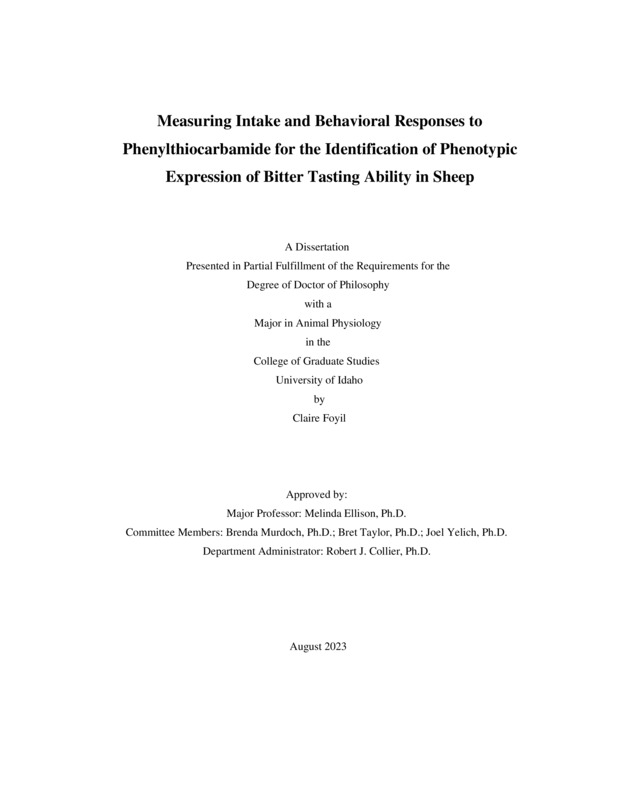Measuring Intake and Behavioral Responses to Phenylthiocarbamide for the Identification of Phenotypic Expression of Bitter Tasting Ability in Sheep
Foyil, Claire Nicole. (2023-08). Measuring Intake and Behavioral Responses to Phenylthiocarbamide for the Identification of Phenotypic Expression of Bitter Tasting Ability in Sheep. Theses and Dissertations Collection, University of Idaho Library Digital Collections. https://www.lib.uidaho.edu/digital/etd/items/foyil_idaho_0089e_12697.html
- Title:
- Measuring Intake and Behavioral Responses to Phenylthiocarbamide for the Identification of Phenotypic Expression of Bitter Tasting Ability in Sheep
- Author:
- Foyil, Claire Nicole
- Date:
- 2023-08
- Keywords:
- behavior bitterness-avoidance phenylthiocarbamide sheep
- Program:
- Animal, Vet & Food Sciences
- Subject Category:
- Animal sciences
- Abstract:
-
Research on the genetic and phenotypic expression of bitter taste perception in sheep suggests bitter-tolerant sheep may be more inclined to consume less palatable rangeland plants. In the absence of definitive genetic tests, the current work focuses on the development of accurate and precise methods for the classifying of bitter-taste-sensing phenotypes (i.e., bitter taster) in sheep. Existing methods for determining bitter taster status of sheep using phenylthiocarbamide (PTC)-spiked drinking water were lengthy, laborious, and limited on sample size. Our first experiment outlines refined methodology for the classification of nearly three times the number of rams, utilizing only two concentrations of PTC-solution over a 2-day test period. During this trial, behavioral reactions uniquely associated with each PTC-tasting phenotype were also identified. A later attempt to develop methods utilizing an involuntary drench to deliver PTC-solution suggests that the use of behavioral analysis for the identification of bitter tasting phenotypes in sheep may be limited to voluntary preference tests. Although bitter taster status impacts dietary preference in humans, literature regarding the influence of bitter taste perception on the foraging behavior of sheep is limited. Subsequent tests using intake of both internal and topical applications of PTC-treated feed to identify bitter tasting ability were inconclusive. While some mature rams showed reluctance to consume PTC-treated feed, ram lambs consumed PTC pellets to near entirety. Although ram lambs did not demonstrate an aversive feed intake response, behavioral reactions indicative of bitter sensitivity were observed among individual sheep. Factors outside of genetics, such as physiological state or learned behaviors may play an important role in voluntary diet decision making in sheep. Efficient methods for the identification of bitter taster phenotypes are the first step in determining the effects of bitter tasting ability on dietary selection in sheep.
- Description:
- doctoral, Ph.D., Animal, Vet & Food Sciences -- University of Idaho - College of Graduate Studies, 2023-08
- Major Professor:
- Ellison, Melinda J
- Committee:
- Yelich, Joel V; Murdoch, Brenda M; Taylor, J Bret; Collier, Robert
- Defense Date:
- 2023-08
- Identifier:
- Foyil_idaho_0089E_12697
- Type:
- Text
- Format Original:
- Format:
- application/pdf
- Rights:
- In Copyright - Educational Use Permitted. For more information, please contact University of Idaho Library Special Collections and Archives Department at libspec@uidaho.edu.
- Standardized Rights:
- http://rightsstatements.org/vocab/InC-EDU/1.0/

